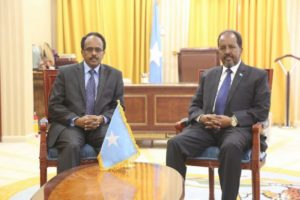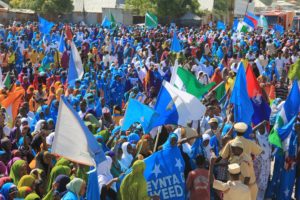By Adam I. Aw Hirsi
First of all, like millions of other Somalis over the world, I’m not only relieved but in fact thrilled at the spectacularly peaceful and majestic transfer of power to which Somalia’s long-awaited and arduous electoral process has culminated in. On a personal level, I’m very proud to have been part of this monumental electoral process. Like every well-meaning Somali individual, I wish the outgoing president well, and the incoming the best of all lucks.

I will be remiss if I leave the grace with which the outgoing president handled himself at his moment of truth unacknowledged. Among other not-so-flattering attributes -humans tend to err- Hassan Sheikh Mohamud will be remembered as a bold no-nonsense Somali leader and a brave personality who saw his country through myriad of hurdles in one of its most difficult periods. Again, I had been privileged to be seated in the first row of many of those milestones. By the way, none of us needs reminded that Mr. Mohamud, in the service of our country, nearly lost his own life at least twice – one in Jazeera Hotel and the other in Villa Somalia. We are very grateful for your service and sacrifice, Mr. President.
Post-election, many of you have seen, and many like me fully grasp the underlying cause of the nationalist fervor and overblown enthusiasm with which the Somali people inside Somalia and outside of it have welcomed the election of the new president. That, I believe, is a good thing as it is always great to be embraced than shunned. On the flip side, the hyperbolic intermittent bellicose dog whistles that were interspersed in the torrents of grassroots level genuinely positive reactions of an agonized nation towards a landmark national process that ended in peaceful and dignified manner should remain, in my humble opinion, overlooked.
Now that the presidential election campaign, the Farmaajomania, and it’s paraphernalia, the actual election itself and the euphoria of a populist victory behind us, one cannot avoid pondering the next steps, the stops, pitfalls and hidden icebergs surrounding the ship of the state. Let me have my say.
First thing First: the Prime Minister and Cabinet
Constitutionally speaking, the biggest and most consequential decision that the president makes is the appointment of the prime minister. This is the make or break moment, the pick that will either dash or further stimulate the hopes of the celebrating hordes.
A seasoned tropical doctor would prescribe a competent and roll-up-sleeves technocrat, preferably apolitical and relatively young prime minister who, due to his in-depth knowledge of the current state of affairs, is able to hit the ground running. Lest some of my readers construe this as a job application on my part, let me redeem myself by pointing out to the fact that due to the 4.5 monster, I’m not qualified to serve in president Farmaajo’s cabinet.
The appointment of a prime minister must be seamless and quick as any politically literate would assume that the incoming president and his campaign team had at least a short list of sorts in mind as they were perfecting their successful campaign that saw them take the nation’s top seat peacefully as skillfully.
Unless there has just been a miraculous (it is a miracle year, don’t you agree) constitutional amendment allowing the cabinet to by-pass the parliament, we all know that one cannot get their wish list of ministers. Realistically, the bulk of the cabinet members will come through political horse-trading, payback of political debts, street smarts, geographical and ethnic calculations, and all the other ills that ail our country. However, the vital dockets in the cabinet -I will highlight few of them below- must be filled with commensurate personalities.
For the presidency to embark upon nitty gritty of policy implementations prior to the appointment of a prime minister and the subsequent formation of cabinet will not augur well for a country the current provisional constitution of which seems exactly designed for friction and mistrust within the two-headed executive branch of its government.
Likewise, the appointment of a novice or a jaded bribe magnet/dispenser and overly politicized person to head the cabinet can either subject the country to an unaffordable long learning curve;, on-the-job training in other words, or repeat the despised déjà vu of ‘president and prime minister at loggerheads.’
Taking the Constitutional Review Process Head-on and Seriously
It will be an unforgivable insult to my readers if I dwell on the importance to review and implement the Somalia Provisional Constitution. The relationship between the Federal Government of Somalia and the Federal Member States on the one hand, and the working modalities between the highest offices of the FGS itself on the other, is something that need to be discussed, agreed on, fleshed out and enshrined in the constitution. If we don’t like something that’s in the constitution, I think we can remove it, not cavalierly tremble on it.
The enormity of this task calls for the skill, willingness and temperament of a capable and seasoned cabinet member and underpinning competent civil servants. The international community on its part will have to make the required financial resources and necessary technical expertise available for this endeavor. Same is true for finance, defense, foreign, planning and justice portfolios.
Amicable Relationship with the Federal Member States: “The NLF” in a Word
In the spirit of national unity, coherence and, well, practicality, the federal government will be better advised to forge and maintain pragmatic and cordial relationship with the federal member states that form the Somali Federal Republic. One can’t see any reason why there must not be a cordial and solid working relationship between the center and the periphery of the Somali federal political structures.
Extra-constitutional or not, the National Leadership Forum (NLF) has been and is a reality that has worked for Somalia throughout the recently successfully concluded electoral process – among other vital undertakings. There is little dispute that without the NLF arrangement, the historical elections of the sort we have witnessed would have been unthinkable.
What could be hidden from the common Somali is that during the last one year or so, in addition to the widely known electoral process, the NLF has been making collective and mostly wise decisions ranging from national policing model, overall national security policy, strategy and structure, resource sharing modalities discussions, and as far as how the states should go about sending pilgrims to Holy Mecca.

subscribes to the notion that Somalia is too fragile and too fragmented to be trusted with one office in Mogadishu. Until such a time when the constitutionally mandated Inter State Commission is established, capacitated and operationalized and is working in full throttle, there is no other practical way around keeping the NLF in place. With a new sheriff in town, the temptation to paint the neighborhood in a color of one’s own choosing must be resisted. It is not going to work that way, at least not smoothly.
On the other hand, state presidents must heed the verdict of their own people and demonstrably collaborate with the new administration. In this way, the risk of stand-off between state governments and the center can be equally avoided by both sides. The enemy isn’t us after all. It is corruption, terror and the famine they beget.
The Reconstitution and Operationalizing of the Somali National Army and Other Security Organs
In the quest of an army of national character, state (federal member states) troops a.k.a Darawish that have their legal demarcations and operational guidelines, national and state police and intelligence services with defined jurisdictions and delineated hierarchies, the only way to go is to fully embrace the existing national security documents/strategy and advance them hand in hand with the authorities of state governments (the NLF again.)
This is absolutely not to ignore, or in any way seek to downplay the primacy of the federal government and the incoming president’s overwhelming mandate as well as his platform and primary campaign pledge that he will reform and revitalize the Somali National Security Forces. Rather, it is to ensure to avoid anything that could frustrate the same. The essential fact of the matter is that for the ship of the state to sail on an even keel, all hands must be on the deck, and all of them at once.
Our Neighbors: Troop Contributing Countries
The last thing a grieving parent who has recently lost a son or a daughter in the peacekeeping mission in Somalia would want hear is that the Somalia government or its people view their departed loved one as an unwanted invader. I honestly believe we can work on our tones discussing the African troops in Somalia. There’s no substantial disagreement that even if the AMISOM withdraws from Somalia tomorrow morning, we will still be the neighbors with Ethiopia, Kenya, Djibouti, and to some extent with Uganda itself. None of our countries can ditch the continent altogether, or even relocate to the other parts of it. Therefore, we have to find ways to make our neighborhood more peaceful and pleasant to live in.
This doesn’t necessarily mean that all is well and great with the peacekeeping mission in Somalia. Mistakes do happen for any reasons, and wise people discuss about them and eventually remedy them. If managed effectively, the net result of mistakes are experience and lessons to avoid making the same ones ever again. These facts and others call for a good relationship and carefully worded discourse towards our neighboring countries -and vice versa – especially those whose sons and daughters bleed and die with ours day and day out in their collective pursuit of long lasting peace in Somalia.
On their part, the neighbors of Somalia need to be more forthright, more understanding and more accommodating as Somalis labor with the resurrection, reconstruction and remodeling of their once beautiful country.
“Ar Farmaajo ii geeya”
“You guys take me to Farmaajo.”
Crowd, chanting: “Waa laguu geehaa.” “You will be taken to him.”
Adam I. Aw Hirsi
Email: [email protected]
—
Adam I. Aw Hirsi is the Minister of Justice Constitution and Religious Affairs of Jubbaland. This is his own personal opinion and not necessarily that of Jubbaland State Government. Aw Hirsi served the NLF Technical Team (Composed of Ministers from Federal Member States.). He was also a former Senior Policy Advisor to Prime Ministers Shirdoon, Ahmed and Sharmarke (2012 -2015;) Mr. Aw Hirsi coauthored The Vision 2016: Inclusive Politics in Action. He was the Somali government focal point on Inclusive Politics (PSG 1 & 3) of the New Deal of Somalia. Aw Hirsi was also the Governor of Gedo region between 2006 and 2008.
We welcome the submission of all articles for possible publication on WardheerNews.com. WardheerNews will only consider articles sent exclusively. Please email your article today . Opinions expressed in this article are those of the author and do not necessarily reflect the views of WardheerNews.
WardheerNew’s tolerance platform is engaging with diversity of opinion, political ideology and self-expression. Tolerance is a necessary ingredient for creativity and civility.Tolerance fuels tenacity and audacity.
WardheerNews waxay tixgelin gaara siinaysaa maqaaladaha sida gaarka ah loogu soo diro ee aan lagu daabicin goobo kale. Maqaalkani wuxuu ka turjumayaa aragtida Qoraaga loomana fasiran karo tan WardheerNews.
Copyright © 2024 WardheerNews, All rights reserved


